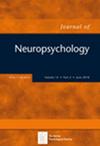Social cognition and real-life functioning in patient samples with 22q11.2 deletion syndrome with or without psychosis, compared to a large sample of patients with schizophrenia only and healthy controls
IF 2
4区 心理学
Q2 PSYCHOLOGY
引用次数: 0
Abstract
Patients with the 22q11.2 deletion syndrome (DS) show an increased risk of developing a psychotic illness lifetime. 22q11.2DS may represent a reliable model for studying the neurobiological underpinnings of schizophrenia. The study of social inference abilities in a genetic condition at high risk for psychosis, like 22q11.2DS, may shed light on the relationships between neurocognitive processes and patients' daily general functioning. The study sample consisted of 1736 participants, divided into four groups: 22q11.2DS patients with diagnosis of psychotic disorder (DEL SCZ, N = 20); 22q11.2DS subjects with no diagnosis of psychosis (DEL, N = 43); patients diagnosed with schizophrenia without 22q11.2DS (SCZ, N = 893); and healthy controls (HC, N = 780). Social cognition was assessed through The Awareness of Social Inference Test (TASIT) and general functioning through the Specific Levels of Functioning (SLoF) scale. We analysed data through regression analysis. The SCZ and DEL groups had similar levels of global functioning; they both had significantly lower SLoF Total scores than HC (p < .001); the DEL SCZ group showed significantly lower scores compared to the other groups (SCZ, p = .004; DEL, p = .003; HC, p < .001). A significant deficit in social cognition was observed in the three clinical groups. In the DEL SCZ and SCZ groups, TASIT scores significantly predicted global functioning (p < .05). Our findings of social cognition deficit in psychosis-prone patients point to the possible future adoption of rehabilitation programmes, like Social Skills Training and Cognitive Remediation, during premorbid stages of psychosis.伴有或不伴有精神病的22q11.2缺失综合征患者样本的社会认知和现实生活功能,与仅患有精神分裂症的患者和健康对照的大样本相比
22q11.2缺失综合征(DS)患者一生中患精神疾病的风险增加。22q11.2DS可能是研究精神分裂症的神经生物学基础的可靠模型。对像22q11.2DS这样的精神病高危遗传条件下的社会推理能力的研究,可能会揭示神经认知过程与患者日常一般功能之间的关系。研究样本包括1736名参与者,分为四组:22q11.2诊断为精神障碍的ds患者(DEL SCZ, N = 20);22q11.2无精神病诊断的ds受试者(DEL, N = 43);无22q11.2DS的精神分裂症患者(SCZ, N = 893);健康对照(HC, N = 780)。通过社会推理意识测验(TASIT)评估社会认知,通过特定功能水平量表(SLoF)评估一般功能。我们通过回归分析对数据进行分析。SCZ组和DEL组的整体功能水平相似;两者的SLoF总分均显著低于HC (p < .001);DEL SCZ组得分显著低于其他组(SCZ, p = 0.004;DEL, p = .003;HC, p < .001)。在三个临床组中观察到明显的社会认知缺陷。在DEL SCZ和SCZ组中,TASIT评分显著预测整体功能(p < 0.05)。我们对精神病易发患者社会认知缺陷的研究结果表明,在精神病发病前阶段,未来可能采用康复方案,如社会技能训练和认知补救。
本文章由计算机程序翻译,如有差异,请以英文原文为准。
求助全文
约1分钟内获得全文
求助全文
来源期刊

Journal of Neuropsychology
医学-心理学
CiteScore
4.50
自引率
4.50%
发文量
34
审稿时长
>12 weeks
期刊介绍:
The Journal of Neuropsychology publishes original contributions to scientific knowledge in neuropsychology including:
• clinical and research studies with neurological, psychiatric and psychological patient populations in all age groups
• behavioural or pharmacological treatment regimes
• cognitive experimentation and neuroimaging
• multidisciplinary approach embracing areas such as developmental psychology, neurology, psychiatry, physiology, endocrinology, pharmacology and imaging science
The following types of paper are invited:
• papers reporting original empirical investigations
• theoretical papers; provided that these are sufficiently related to empirical data
• review articles, which need not be exhaustive, but which should give an interpretation of the state of research in a given field and, where appropriate, identify its clinical implications
• brief reports and comments
• case reports
• fast-track papers (included in the issue following acceptation) reaction and rebuttals (short reactions to publications in JNP followed by an invited rebuttal of the original authors)
• special issues.
 求助内容:
求助内容: 应助结果提醒方式:
应助结果提醒方式:


